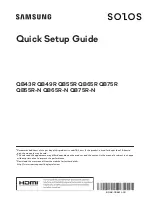
QHY163M
24
8.
What’s on-camera DDR buffer and what is benefit for?
The QHY163M has the on-camera 128MB DDRII image buffer. It brings two advantages: It can buffer
whole image and avoid it lost during USB transfer. Because CMOS sensor outputs the image
continuous after exposure end and it does not allow the pause. But the computer may have some
pause due to the multi-task feature of the windows. If the pause is too long, the small buffer in the
USB transfer chip will full and the coming image data will lost. And it will cause one frame is lost some
data and this frame will be a bad frame. For short exposure it maybe not cause big problem because
the next frame will comes soon. But for long exposure it means you lost a long exposure frame. The
128MB DDRII buffer can solve this problem by storing the whole frame into it and transfer. Even the
computer has big pause it will not lost data.
Another advantage is that it will make the video more smooth when in some slow computer or some
mainboard which is not friendly to USB3.0 (like the VIA chipset). In these computers they cannot
handle the high speed USB data well and the data is always lost. With this DDR it can buffer the
input image data and then send to computer. Even the high frequency pause happens, it can keep
the USB data lossless.
SharpCap version has options for enabling/disabling the DDR buffer. The current ASCOM driver is
always working under DDR enabled mode.
9.
How to protect the cooler in QHY163M?
The cooler in QHY163M can lower the CMOS temperature to a value
that’s almost 40 degrees
centigrade below the ambient temperature. So you need to be careful to avoid thermal shock, which
refers to when the
cooler’s temperature rises or fall dramatically, the cooler is subjected to strong
internal stress due to contraction principle. Drastic thermal shock can
shorten cooler’s service life or
permanently break it.
So when you begin to adjust the CMOS temperature, you should avoid setting
“Cooler Power” to its









































